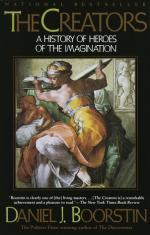|
This section contains 452 words (approx. 2 pages at 400 words per page) |

|
Part 7, Sections 36-40 Summary and Analysis
In Section 36: The Freedom to Choose, John Milton's "Paradise Lost" created "poetry and prose of the pains, rewards, and vagaries of man's adventures in choice" (p. 320). After publishing "Comus" in 1634 and "Lycidas" in 1637, Milton spent twenty years writing prose, including "Defense of the English People" in 1649 and "Of Education", one of the last manifestos of Renaissance humanism in 1644. After being imprisoned and going blind, Milton wrote his great epic, "Paradise Lost", where the drama and tragedy come from the choices made by God, Satan, Eve, Christ and Adam. Milton also wrote "Paradise Regained" (1671) and "Samson Agonistes" (1671), though he never sought solace in easy dogma or became a member of any sect. Few poets ever did more to make the English language live than Milton.
In Section 37: Sagas of Ancient Europe, the sage of empire was added to...
(read more from the Part 7, Sections 36-40 Summary)
|
This section contains 452 words (approx. 2 pages at 400 words per page) |

|




